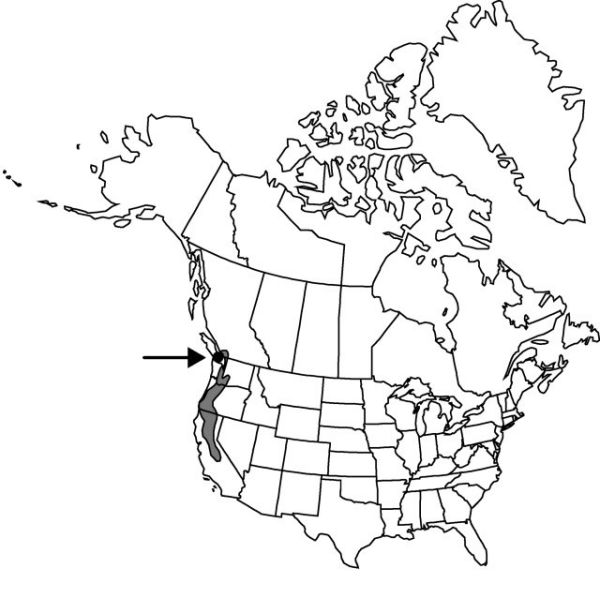Difference between revisions of "Brodiaea coronaria subsp. coronaria"
Basionym: Brodiaea howellii Eastwood
Synonyms: Brodiaea grandiflora Smith Brodiaea synandra (A. Heller) Jepson
FNA>Volume Importer |
FNA>Volume Importer |
||
| Line 10: | Line 10: | ||
|name=Brodiaea grandiflora | |name=Brodiaea grandiflora | ||
|authority=Smith | |authority=Smith | ||
| − | }}{{Treatment/ID/Synonym | + | }} {{Treatment/ID/Synonym |
|name=Brodiaea synandra | |name=Brodiaea synandra | ||
|authority=(A. Heller) Jepson | |authority=(A. Heller) Jepson | ||
| Line 28: | Line 28: | ||
|elevation=0–1600 m | |elevation=0–1600 m | ||
|distribution=B.C.;Calif.;Oreg.;Wash. | |distribution=B.C.;Calif.;Oreg.;Wash. | ||
| − | |discussion=<p>Subspecies coronaria, like Brodiaea elegans subsp. elegans, is very widespread and grows well in a variety of conditions. It is found primarily in the grasslands of California valleys and in the prairies of western Oregon and Washington. The 2n = 12 populations are found in the northern (Oregon and Washington) and southern (central California) parts of the range, while the 2n = 24 populations are found in the middle part of the range (northern California and southern Oregon).</p> | + | |discussion=<p>Subspecies coronaria, like <i>Brodiaea elegans </i>subsp.<i> elegans</i>, is very widespread and grows well in a variety of conditions. It is found primarily in the grasslands of California valleys and in the prairies of western Oregon and Washington. The 2n = 12 populations are found in the northern (Oregon and Washington) and southern (central California) parts of the range, while the 2n = 24 populations are found in the middle part of the range (northern California and southern Oregon).</p> |
|tables= | |tables= | ||
|references= | |references= | ||
| Line 52: | Line 52: | ||
|publication year= | |publication year= | ||
|special status= | |special status= | ||
| − | |source xml=https://jpend@bitbucket.org/aafc-mbb/fna-data-curation.git/src/ | + | |source xml=https://jpend@bitbucket.org/aafc-mbb/fna-data-curation.git/src/8f726806613d60c220dc4493de13607dd3150896/coarse_grained_fna_xml/V26/V26_647.xml |
|genus=Brodiaea | |genus=Brodiaea | ||
|species=Brodiaea coronaria | |species=Brodiaea coronaria | ||
Revision as of 16:46, 18 September 2019
Corm coat heavily fibrous. Scape 5–25 cm. Flowers: perianth bluish violet or bluish purple, tube 6–13 cm, lobes 15–25 mm; anther apex hooked; staminodia white; ovary 8–9 mm; style 9–11 mm. 2n = 12, 24, 42.
Phenology: Flowering spring (Apr–Jun).
Habitat: Grasslands, volcanic mesas
Elevation: 0–1600 m
Distribution

B.C., Calif., Oreg., Wash.
Discussion
Subspecies coronaria, like Brodiaea elegans subsp. elegans, is very widespread and grows well in a variety of conditions. It is found primarily in the grasslands of California valleys and in the prairies of western Oregon and Washington. The 2n = 12 populations are found in the northern (Oregon and Washington) and southern (central California) parts of the range, while the 2n = 24 populations are found in the middle part of the range (northern California and southern Oregon).
Selected References
None.
Lower Taxa
None.